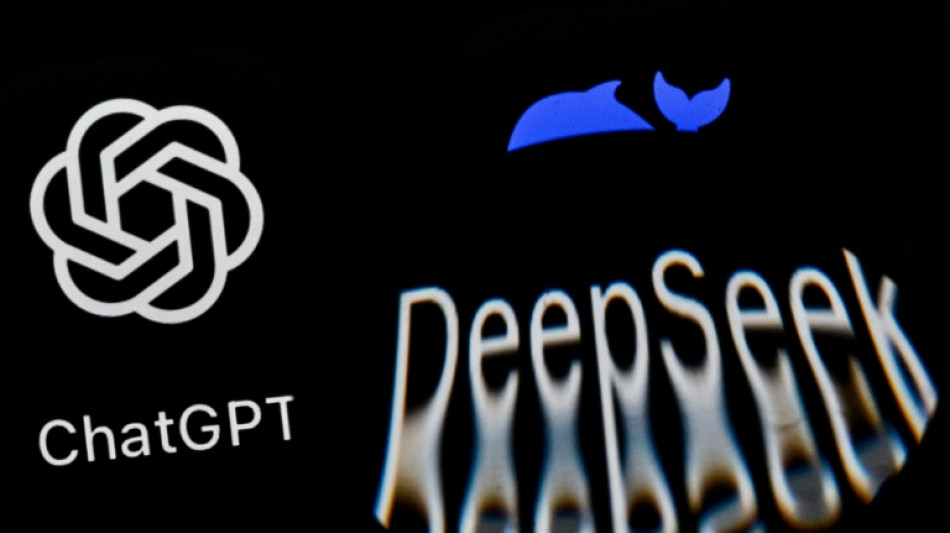
-
 Olympic chiefs admit 'still work to do' on main ice hockey venue
Olympic chiefs admit 'still work to do' on main ice hockey venue
-
Pope says Winter Olympics 'rekindle hope' for world peace

-
 Last-gasp Demirovic strike sends Stuttgart fourth
Last-gasp Demirovic strike sends Stuttgart fourth
-
Sesko strikes to rescue Man Utd, Villa beaten by Brentford

-
 'At least 200' feared dead in DR Congo landslide: government
'At least 200' feared dead in DR Congo landslide: government
-
Coventry says 'sad' about ICE, Wasserman 'distractions' before Olympics

-
 In-form Lyon make it 10 wins in a row
In-form Lyon make it 10 wins in a row
-
Man Utd strike late as Carrick extends perfect start in Fulham thriller

-
 Van der Poel romps to record eighth cyclo-cross world title
Van der Poel romps to record eighth cyclo-cross world title
-
Mbappe penalty earns Real Madrid late win over nine-man Rayo

-
 Resurgent Pakistan seal T20 sweep of Australia
Resurgent Pakistan seal T20 sweep of Australia
-
Fiji top sevens standings after comeback win in Singapore

-
 Alcaraz sweeps past Djokovic to win 'dream' Australian Open
Alcaraz sweeps past Djokovic to win 'dream' Australian Open
-
Death toll from Swiss New Year bar fire rises to 41

-
 Alcaraz says Nadal inspired him to 'special' Australian Open title
Alcaraz says Nadal inspired him to 'special' Australian Open title
-
Pakistan seeks out perpetrators after deadly separatist attacks

-
 Ukraine war talks delayed to Wednesday, Zelensky says
Ukraine war talks delayed to Wednesday, Zelensky says
-
Djokovic says 'been a great ride' after Melbourne final loss

-
 Von Allmen storms to downhill win in final Olympic tune-up
Von Allmen storms to downhill win in final Olympic tune-up
-
Carlos Alcaraz: tennis history-maker with shades of Federer

-
 Alcaraz sweeps past Djokovic to win maiden Australian Open title
Alcaraz sweeps past Djokovic to win maiden Australian Open title
-
Israel says partially reopening Gaza's Rafah crossing

-
 French IT giant Capgemini to sell US subsidiary after row over ICE links
French IT giant Capgemini to sell US subsidiary after row over ICE links
-
Iran's Khamenei likens protests to 'coup', warns of regional war

-
 New Epstein accuser claims sexual encounter with ex-prince Andrew: report
New Epstein accuser claims sexual encounter with ex-prince Andrew: report
-
Italy's extrovert Olympic icon Alberto Tomba insists he is 'shy guy'

-
 Chloe Kim goes for unprecedented snowboard halfpipe Olympic treble
Chloe Kim goes for unprecedented snowboard halfpipe Olympic treble
-
Pakistan combing for perpetrators after deadly separatist attacks

-
 Israel partially reopens Gaza's Rafah crossing
Israel partially reopens Gaza's Rafah crossing
-
Iran declares European armies 'terrorist groups' after IRGC designation

-
 Snowstorm disrupts travel in southern US as blast of icy weather widens
Snowstorm disrupts travel in southern US as blast of icy weather widens
-
Denmark's Andresen swoops to win Cadel Evans Road Race

-
 Volkanovski beats Lopes in rematch to defend UFC featherweight title
Volkanovski beats Lopes in rematch to defend UFC featherweight title
-
Sea of colour as Malaysia's Hindus mark Thaipusam with piercings and prayer

-
 Exiled Tibetans choose leaders for lost homeland
Exiled Tibetans choose leaders for lost homeland
-
Afghan returnees in Bamiyan struggle despite new homes

-
 Mired in economic trouble, Bangladesh pins hopes on election boost
Mired in economic trouble, Bangladesh pins hopes on election boost
-
Chinese cash in jewellery at automated gold recyclers as prices soar

-
 Israel to partially reopen Gaza's Rafah crossing
Israel to partially reopen Gaza's Rafah crossing
-
'Quiet assassin' Rybakina targets world number one after Melbourne win

-
 Deportation raids drive Minneapolis immigrant family into hiding
Deportation raids drive Minneapolis immigrant family into hiding
-
Nvidia boss insists 'huge' investment in OpenAI on track

-
 'Immortal' Indian comics keep up with changing times
'Immortal' Indian comics keep up with changing times
-
With Trump mum, last US-Russia nuclear pact set to end

-
 In Sudan's old port of Suakin, dreams of a tourism revival
In Sudan's old port of Suakin, dreams of a tourism revival
-
Narco violence dominates as Costa Rica votes for president

-
 Snowstorm barrels into southern US as blast of icy weather widens
Snowstorm barrels into southern US as blast of icy weather widens
-
LA Olympic chief 'deeply regrets' flirty Maxwell emails in Epstein files

-
 Rose powers to commanding six-shot lead at Torrey Pines
Rose powers to commanding six-shot lead at Torrey Pines
-
Barca wasteful but beat Elche to extend Liga lead


Does "vibe coding" make everyone a programmer?
Can a complete tech novice create a website using everyday language on ChatGPT?
That's the promise, misleading for some, of "vibe coding," the latest Silicon Valley catchphrase for an advance in generative AI that some say makes computer programming as simple as chatting online.
"You fully give in to the vibes, embrace exponentials, and forget that the code even exists," OpenAI co-founder and former Tesla employee Andrej Karpathy described in early February, in a message posted on X (formerly Twitter), using the term for the first time.
"I'm building a project or web app, but it's not really coding - I just see stuff, say stuff, run stuff, and copy paste stuff, and it mostly works," he said.
The developer and entrepreneur was referring to the new generative AI models that produce lines of code on demand in everyday language, through writing or speech.
The concept of "vibe coding" remained confined to the AI community until New York Times columnist Kevin Roose claimed to have created websites and apps without any knowledge of programming.
"Just having an idea, and a little patience, is usually enough," he wrote.
The ChatGPT and Claude interfaces can write an entire program line by line on demand, as can Gemini, which launched its dedicated version, Gemini Canvas, on Tuesday.
Other generative AI platforms specifically dedicated to coding have also made their mark in recent months, from Cursor to Loveable, or Bolt, Replit and Windsurf.
"Maybe, just maybe, we're looking at a fundamental shift in how software is created and who creates it," said online marketing specialist Mattheo Cellini on Substack.
"It's unlikely to make coding irrelevant, but it may change the way developers work," suggested Yangfeng Ji, professor of computer science at the University of Virginia.
"This could lead to some job displacement, particularly for those focused solely on basic coding tasks."
Even before "vibe coding," a downturn was being seen by some in IT employment as the first effects of generative AI began to be felt.
The sector shed nearly 10,000 jobs in the US in February, according to the Department of Labor, and its headcount is at a three-year low.
- Expertise needed? -
Among code novices, many find it hard to catch the vibe.
"People who do not have programming expertise often struggle to use these kinds of models because they don't have the right kinds of tools or knowledge to actually evaluate the output," said Nikola Banovic, professor of computer science at the University of Michigan.
On social media, the few newbies who report on their "vibe coding" quickly complain that it's not as easy as some want to believe.
Without mastering computing complexities like digital directories, runtime environments or application programming interfaces (APIs), it's hard to create an app that works.
Despite his coding knowhow, Claude Rubinson, a professor of sociology at the University of Houston-Downtown, wanted to create an application for his students two years ago without tinkering with the code generated by ChatGPT.
After a lot of trial and error, the app finally worked, but "I'm convinced it wouldn't have worked if I hadn't understood the code," which allowed him to guide the interface using the appropriate language.
This brought home the importance of the "prompt": mastering the request submitted to obtain the desired result.
"Programmers have certain levels of AI literacy that allows them to get what they want out of the models," said Banovic.
Everyday users "will not know how to prompt," h warned.
K.Thomson--BTB



